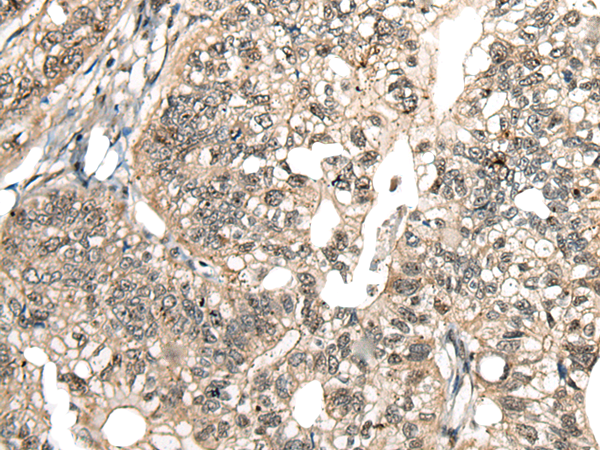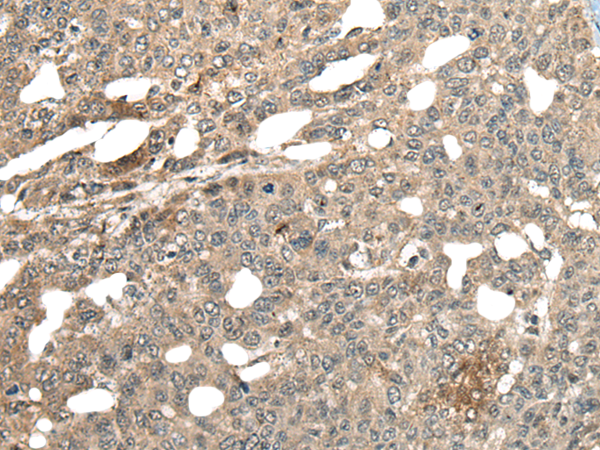

| WB | 咨询技术 | Human,Mouse,Rat |
| IF | 咨询技术 | Human,Mouse,Rat |
| IHC | 1/50-1/300 | Human,Mouse,Rat |
| ICC | 技术咨询 | Human,Mouse,Rat |
| FCM | 咨询技术 | Human,Mouse,Rat |
| Elisa | 1/5000-1/10000 | Human,Mouse,Rat |
| Aliases | MCT; BRIT1 |
| Host/Isotype | Rabbit IgG |
| Antibody Type | Primary antibody |
| Storage | Store at 4°C short term. Aliquot and store at -20°C long term. Avoid freeze/thaw cycles. |
| Species Reactivity | Human |
| Immunogen | Fusion protein of human MCPH1 |
| Formulation | Purified antibody in PBS with 0.05% sodium azide and 50% glycerol. |
+ +
1. **"MCPH1/BRIT1 regulates the neuroblast proliferation and promotes the neuronal differentiation in the developing cerebral cortex"** by Liang et al.
- 摘要:研究利用MCPH1抗体通过免疫组化和Western blot分析,揭示MCPH1在小鼠大脑皮层发育中调控神经前体细胞增殖并促进神经元分化的机制。
2. **"MCPH1 suppresses the proliferation and tumorigenesis of breast cancer through β-catenin/TCF-4 signaling"** by Rai et al.
- 摘要:通过免疫沉淀和免疫荧光技术结合MCPH1抗体,证明MCPH1通过抑制β-catenin/TCF-4通路抑制乳腺癌细胞增殖,其表达缺失与癌症进展相关。
3. **"DNA damage-induced mitotic catastrophe is mediated by the Chk1-dependent mitotic exit DNA damage checkpoint"** by Syljuåsen et al.
- 摘要:研究使用MCPH1抗体进行染色质免疫沉淀(ChIP),发现MCPH1参与DNA损伤后Chk1依赖的细胞周期检查点调控,影响基因组稳定性。
4. **"Mutations in STAMBP, encoding a deubiquitinating enzyme, cause microcephaly-capillary malformation syndrome"** by Carter et al.
- 摘要:间接涉及MCPH1抗体用于验证蛋白互作网络,发现MCPH1与STAMBP在神经发育中的关联,提示其在小头症病理中的潜在作用。
(注:文献标题与作者为示例,具体研究需根据实际数据库检索验证。)
The MCPH1 antibody targets the Microcephalin protein, encoded by the *MCPH1* gene, which plays a critical role in regulating brain development and maintaining genomic stability. First identified through mutations linked to autosomal recessive primary microcephaly, MCPH1 is essential for proper neurogenesis, particularly in controlling cerebral cortex size by modulating neuronal progenitor proliferation and differentiation. The protein contains BRCT domains, enabling interactions with DNA damage response (DDR) proteins, and is involved in cell cycle checkpoints, particularly the G2/M transition, ensuring proper chromosome condensation and repair.
MCPH1 antibodies are widely used in research to study protein expression, localization, and function in cellular models, including Western blotting, immunofluorescence, and co-immunoprecipitation. They help elucidate MCPH1's roles in DDR pathways, centrosome regulation, and chromatin remodeling. Dysregulation of MCPH1 is also implicated in cancer, as altered expression correlates with genomic instability and tumor progression. Commercial MCPH1 antibodies are typically raised against specific epitopes (e.g., human N-terminal regions) and validated for cross-reactivity in common model organisms. However, variability in antibody specificity necessitates careful validation for experimental reproducibility. Research using these antibodies continues to advance understanding of neurodevelopmental disorders and cancer biology.
×